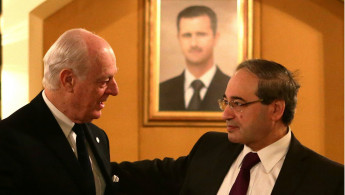Talks on Aleppo ceasefire held in Damascus
Staffan de Mistura, the UN envoy to Syria, will hold talks in Damascus on Saturday in an effort to suspend fighting in the battle-scarred city of Aleppo.
It follows talks two days ago with Syrian Opposition Coalition (SOC) head Khaled Khoja in Istanbul.
Last week, the UN envoy raised hopes about a possible first step to ending the crisis, when Mistura revealed the regime would stop bombing Aleppo for six weeks if an agreement were reached.
But despite Mistura's optimism, Naser al-Hariri of the SOC believes that it is unlikely that a truce will be achieved, and that the regime is to blame for the stalemate.
Speaking to al-Araby al-Jadeed, Hariri said it had become clear that the UN envoy intends to only stop the use of heavy weapons in and around Aleppo, and not an overall cessation of fighting.
Hariri said that the Syrian regime, despite the huge losses it has incurred in northern Aleppo, is still betting on a decisive military solution to recapture the city.
| Damascus reportedly asked one of its most feared officers, nicknamed 'the tiger', to lead operations in Aleppo. |
While talks of a ceasefire were ongoing, Damascus reportedly asked one of its most feared officers, Colonel Suhayl al-Hasan - nicknamed al-Nimer or 'the tiger' - to lead operations in Aleppo.
Troops directly under his command will be operating alongside a large number of fighters from Hizballah, Iran, and other militias.
Lack of confidence
Hariri also believes that talks will ultimately fail, as the UN envoy does not have the international backing to pressure the regime into complying with the Geneva II road map.
The SOC believes the road map should be the framework for an end to the violence in Syria, which has killed hundreds of thousands of people in the past four years.
Mistura has faced criticism from the opposition for saying that Syria's President Bashar al-Assad is part of the solution to the crisis. They also say that the UN envoy did not inform them sufficently about the details of the plan to freeze fighting in Aleppo.
SOC sources say that the UN envoy intends for the local ceasefire in Aleppo to be extended to other areas of Syria hit hard by fighting, such as Eastern Ghouta near Damascus.
A key part of the ceasefire plan would be for UN personnel to be able to travel freely to monitor the situation in and around Aleppo.
The SOC and the National Coordination Body (NCB), an internal opposition group based in Damascus, have announced another road map for a political solution to the crisis in Syria.
Although in principle there have been agreements about the future of Syria between the two groups, the fate of Assad as head of the state remains a massive point of contention.
The SOC, like the vast majority of the opposition parties, are adamant that Assad must go. The NCB, seen as close to regime, believes that Damascus should be part of the solution.
This article is an edited translation from our Arabic edition.





 Follow the Middle East's top stories in English at The New Arab on Google News
Follow the Middle East's top stories in English at The New Arab on Google News
![The UAE is widely suspected of arming the RSF militia [Getty]](/sites/default/files/styles/image_330x185/public/2024-11/GettyImages-472529908.jpg?h=69f2b9d0&itok=Yauw3YTG)
![Netanyahu furiously denounced the ICC [Getty]](/sites/default/files/styles/image_330x185/public/2024-11/GettyImages-2169352575.jpg?h=199d8c1f&itok=-vRiruf5)
![Both Hamas and the Palestinian Authority welcomed the ICC arrest warrants [Getty]](/sites/default/files/styles/image_330x185/public/2024-11/GettyImages-2178351173.jpg?h=199d8c1f&itok=TV858iVg)